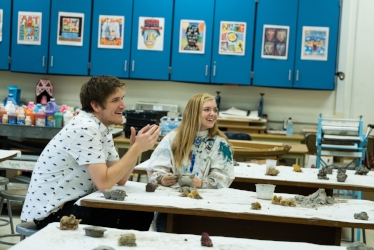Ask a few, random adults about their eighth-grade experiences, and they might shiver in horror or shake their heads as a way to dismiss the question and the memories of the surreal purgatory between preteen innocence and young adulthood. Well, eighth grade might not be that bad, but it can be a most trying time when social pressures, hormonal changes and anxiety peak, and senior year seems five or six centuries away.
Well, Phoenix Film Festival enthusiasts did not have to wait six centuries for writer/director Bo Burnham’s comedy. The 2018 Festival screened “Eighth Grade” - to a sold-out audience - on its closing night, April 15! The next day, Burnham sat down with the Phoenix Film Festival - during a fun and insightful group interview with other movie outlets – and he spoke about his reasons for making the film, coping with today’s technology and much, much more.
“Eighth Grade” stars Elsie Fisher and Josh Hamilton, and it arrives in theatres on Friday, July 20.
Q: Your film is from an eighth-grade girl’s perspective. How did you find this character?
BB: I wanted to write about the Internet. So, I wrote a ton of stuff with all these different characters, stumbled upon Kayla (Fisher) and found that I could say everything (that) I wanted through her.
So, it was not a conscious decision to write about an eighth-grade girl.
I (am) violently-aware that I (am) a man. Truly. So, I (proceeded) with caution, but I mean, it just felt natural to me. I think on the Internet, we all act like eighth graders, so it makes a lot of sense that a movie about the Internet would be about an eighth grader. I think eighth graders are the only ones being themselves on the Internet. We’re all being more immature versions of ourselves, (but) then I watched hundreds of videos of kids.
Boys talked about Minecraft, and girls talked about their souls. At that age, at least, the girls run severely more deep and interesting. The eighth-grade boys’ stories are just a little more cloister or closed-off. I think girls – for whatever reason…cultural pressures, whatever – are sort of forced to see themselves in that narrative a lot earlier than boys.
Boys. I don’t even know what they are thinking about at that age. I met lot of them, and I still don’t know what they are thinking about. The girls can actually have adult conversations and can actually talk. They seem like young adults who are very, very thoughtful, and the boys are just like, ya know…
Bo Burnham and Elsie Fisher on the set of EIGHTH GRADE
Q: In the mall, Kayla meets an older classmate’s friends, but some of them dismiss her, because she is a few years younger, a different generation in a way. Generations seem to have wide swathes of years (Baby Boomers, Generation X, etc.), but do you think that they are shrinking these days because of technology?
BB: I do. It feels like it! My girlfriend is 12 years older than me, and we feel closer than people four years younger than me. I got Facebook, when I was 16 or 17 and had a little sense of myself before social media. I would’ve been very different if I had Facebook (during) my freshman year of high school, only three years earlier.
These sort of paradigm-shifting things are happening (all the time). It used to be, (that we had) the printing press and then the Model T and then now…
There was a whole decade of people who listened to The Beatles. Now, the culture turns over so, so quickly, do we even remember before 2017? When was Obama president? Like 12 years ago? The generations are getting shorter, because time is getting wider, or something.
Q: It feels like the culture changes from year to year. References that are “in” now will be “out” one year from now.
BB: Yea, culture ages like milk. It’s why a lot of movies are nostalgic and set in other time periods, because people hate the current moment. They think that we don’t even have a culture. I think it may be right in a sense, that our culture is just recycling other images. Like a weird dishwasher spin cycle of retro stuff, which is sad and strange.
PFF's Jeff Mitchell with Bo Burnham
Q: Retro is kind of “in” right now.
BB: Yea, but what were the Aughts? We know what the 90’s were. We know what the 80’s were. What were the Aughts? Were they something? What (is) now? Do we have a name for this decade? I don’t know. It’s a weird moment. To be a kid in it is just wild.
Q: Would you want to live in a time before all of this technology?
BB: No, no, I don’t think so. I’d probably be happier. I definitely wouldn’t want to write about another time. I’m interested about this time. It’s an interesting time to be alive and to be American and to be in the culture.
(Pause…) Yea, I’d probably like to be in another time, (and) go back to cassette players and half the country not hating the other half of the country. That’s fine.
Q: This is your John Hughes’ moment, because “Eighth Grade” captures what it’s like to be a kid during this time.
BB: Hughes is a good reference in a sense, because he captured – at the time – something very true. The crux of the struggle of being a teen in the 1980’s was: how do you fit into the ecosystem of the (classroom)? How do you feel (about) your parents and your family? He captured it so well, that (filmmakers) have just recycled (these concepts) with different cultural decorations in different decades, but I don’t think it’s the core issue that kids are dealing with (today).
So, you (can have) them dealing with being a jock or an emo kid with a cellphone, but for me, the struggle with being a kid now is interior. If you notice in the movie, Kayla doesn’t get bullied. She just gets ignored. She just doesn’t (receive other kids’) attention, and (they) are giving or withholding (it) to each other. Dispassionate attention is the sort of currency that goes around.
We’re almost (wishing) for the days of high school hierarchy, parents who hated us and yelled at us, and we slammed the door in their faces. Now, we are these fragile, little ego-people in our own heads, and our parents are looking at us like, “Are you okay?” There are a bunch of kids on their phones, hyperconnected and super-lonely. Overstimulated and completely numb, and I think that extends to adults too. I think the bigger American problem is there’s no sense of community. Even the jocks, the nerds, the cheerleaders, and the dorks. That is a community. So, the breakdown of that is sad, in a way.
Bo Burnham at the 2018 Phoenix Film Festival. Photo by Jennifer Mullins
Q: Kayla and her father (Josh Hamilton) have a good relationship, even though she is more wrapped up with school, trying to make friends and focused on her phone. What if her dad started dating? Would she fight for attention or continue to pull back?
BB: That’s hilarious. I don’t know. There are only five days in the life (of this movie). That’s a whole other movie. So much of the story is about the tiny things in Kayla’s life (that) are huge to her. We are going really deep into five days, but at the end of the “day”, you don’t know her completely. There are things that Kayla and her dad only know, and things that only she knows.
Q: Every little event in school is a huge moment or struggle for Kayla, it seems.
BB: Exactly. I think that’s why kids relate to Harry Potter. They actually don’t see Harry Potter (films) as escapist. They see (those movies) as realistic. Could we make a movie that has a high stakes-feeling (like) those Young Adult films, but the actual stakes are pretty low? For Kayla, walking to the pool party (is like) walking into some giant, hellish cave or something. So, that was the hope: to balance or synch the heartrates of Kayla and the audience.
Q: “Eighth Grade” is a coming-of-age film, but it feels like a horror movie at times too. Did you have scary movies in the back of your mind when showing the horrors of eighth grade and the pressures that come with it?
BB: I wasn’t going for that, but I was just trying to be honest. I’m interested in cringe as a high form of empathy. To cringe with something is to feel it. Eighth grade is horrifying. Truly, it is horrifying, and I’m glad that the movie feels like that at times.
Jeff – a member of the Phoenix Critics Circle – has penned film reviews since 2008 and graduated from ASU’s Walter Cronkite School of Journalism. Follow Jeff and the Phoenix Film Festival on Twitter @MitchFilmCritic and @PhoenixFilmFest, respectively.













